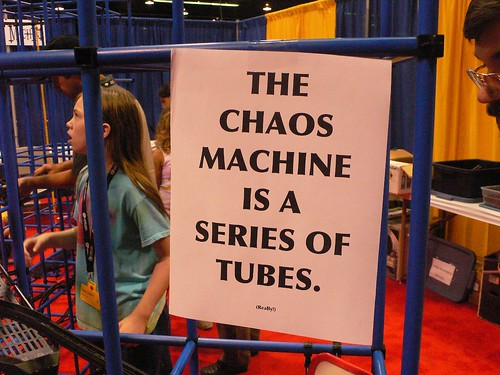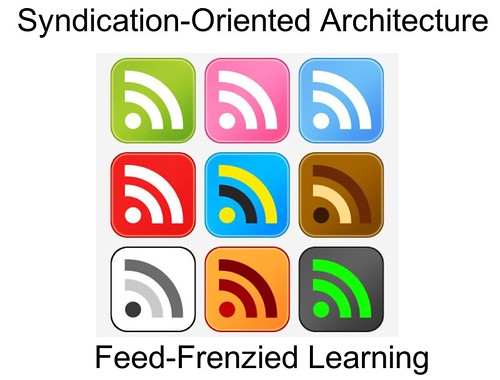Open Platforms for Open Education
Stewart Brand's broad interpretation of "tool" coincided with that given by the designer, philosopher, and engineer Buckminster Fuller, though another thinker admired by Brand and some of his cohorts was Lewis Mumford, who had written about words as tools. Early editions reflected the considerable influence of Fuller, particularly his teachings about "whole systems," "synergetics," and efficiency or reducing waste.
OER as a step... toward reclaiming the mandate of higher education as leaders and guardians of free and open inquiry

Small Pieces... Thoughtfully Joined?
The process is like a transparent layering of key ideas that are taken up again and contextualized anew.
from: The Technology of Collage
"...developing an open source publishing platform ...to gradually integrate into the school’s general education curriculum the deep, critical examination of how digital tools are changing the way we think and live."
from: Luke Waltzer
"RSSify' everything" - Jon Udell (2007)
- Love our Wiki Gardener
- We got http://wiki.ubc.ca/Course
- http://wiki.ubc.ca/Course:MATH110/003 - They will build their own, learn from each other...
- http://wiki.ubc.ca/Course:LIBR548F - Maybe they'll even create resources
- http://wiki.ubc.ca/Documentation - Open documentation
- http://wiki.ubc.ca/Main_Space - who knows?
The Life and Times of a Resource
Here's how we are using a simple overview of social web tools for elearning.
- This overview is actually made up of a set of smaller, more specific web pages.
- Based on how the URL is constructed, it is automatically indexed heirarchically on pages listing documentation and social web tools.
- It is also categorized in folksonomic fashion via in-text tags for elearning resources and resources.
- Via a WordPress plugin we developed, it is syndicated on Brian's blog, on an elearning resources site (with tabbed layout), and on a student resource site (which also has embed code and other goodies to enable sharing).
- The source wiki page also has an "Embed Page" link which allows it to be syndicated inside WebCT Vista (or most other HTML environments) via cut-and-paste code.
- It can also be downloaded as a cleaned-up PDF, either standalone or as part of a larger collection.
"Authoring content in a public forum – ideally under an open content license – means that content becomes available for re-use even as it is being drafted. By opening up comments, feedback can be solicited that allows content to be improved by updating blog posts, if necessary, as well as identifying topics or clarifications that can be addressed in separate backlinking blog posts. By opening up the production process, we make it far more likely that others will contribute to that process, helping shape and influence that content, than expecting others to take openly licensed content as a large chunk and then produced openly licensed derived works as a result (i.e. forks?!)" -- Tony Hirst, Open Course Production
Novak Rogic - A Dose of Reality
Our work is supporting a local business to promote sustainability.
Scott Leslie - A Dose of Lucidity
Now, back to the nonsense. Do we need to keep developing platforms?
...big players like Facebook, Apple, and News Corp are potentially breaking the "small pieces loosely joined" model of the Internet. But perhaps most threatening of all are the natural monopolies created by Web 2.0 network effects.
One of the points I've made repeatedly about Web 2.0 is that it is the design of systems that get better the more people use them, and that over time, such systems have a natural tendency towards monopoly.
And so we've grown used to a world with one dominant search engine, one dominant online encyclopedia, one dominant online retailer, one dominant auction site, one dominant online classified site, and we've been readying ourselves for one dominant social network.
...it's a war against the web as an interoperable platform. Instead, we're facing the prospect of Facebook as the platform, Apple as the platform, Google as the platform, Amazon as the platform, where big companies slug it out until one is king of the hill.
And it's time for developers to take a stand. If you don't want a repeat of the PC era, place your bets now on open systems. Don't wait till it's too late.
-- Tim O'Reilly, The war for the web
- Mobile web applications moving increasingly toward isolated proprietary model, and away from "the internet as platform. A shame, because open standards like RSS can already do so much to enable MobileCourseDiscussions.
- The interests of educators and the public will be secondary at best in corporate systems.
- To what extent does the economics of the Internet today resemble the early days of the automobile a century ago?
What kind of web do we want?
Rather than ask, "how is the web changing the higher education?" ...how can higher education change the web?
Parking Lot (not presented in-session)
Component One: Wiki
- CWL authentication
- private, standalone sites available HLWiki
- "transclusion" - or chunking page content into tiny wiki bits (don't call them granular learning objects, please)
- WikiEmbed plugin: http://frg.sites.olt.ubc.ca/ - gets its content from this wiki. (Demo)
- Extensions include WikiBooks
- Namespaces for courses (example), documentation, etc... Along with categories. Feedback?
- We've hired a Wiki Gardener
Component Two: Blogs
Bloggy blogs
Notable blogs featured on home page of the site
- Courseblogs such as: http://blogs.ubc.ca/etec522/ (new version uses BuddyPress as LMS), http://blogs.ubc.ca/etec540sept09/, http://blogs.ubc.ca/span365/, http://blogs.ubc.ca/libr551/
- UBC Blogsquad - partnering with Student Services
- The Library has long been doing great things on our platform...
Sites
We're going full-blown CMS baby!
You can setup your UBC site in minutes. We support UBC's common look and feel as a theme. Partnering with Public Affairs and IT on delivering a UBC-wide CMS. WordPress has rapidly become the go-to system for site creation at the university.
Some of our sites:
http://leap.ubc.ca, http://celc.sites.olt.ubc.ca/, http://chcm.ubc.ca/, http://earlylearning.ubc.ca/, http://act.elearning.ubc.ca/, http://strategicplan.ubc.ca/, http://aboriginal.sites.olt.ubc.ca/ (private, in development), http://thischangedmypractice.com/
Economics of Open Development
Mostly developed by wider WordPress community, but at least some bits of custom code
- CWL authentication
- privacy controls for public, CWL-holders, or registered users (visibility and comments)
- add users via widget or via custom screen
- Section Widget - WordPress Plugin Award Winner
And a fairly wide array of plugins (our admin is very good at monitoring their effects on system performance)
Plugins developed by CTLT can be found on the OLT Dev WordPress.org plugins page.
Lots more open source, open standards, open content, open data and hopefully open minds.
Cost savings are waiting
- Open educational resources can greatly reduce production costs. Reusing the WP documentation from Jim Groom and UMW saved us lots of time, and got our platform up sooner.
- UMWBlogs - "Two years worth of iteration and development given to Longwood in less than an hour."
- continue to push the boundaries for our platforms:
- http://phylogame.org/ - assemble new image sets, or even games based on this framework: see the discussion
- one can imagine instant generation of games into any number of knowledge domains, based on open data and relational queries to sources such as Wikipedia (ahem... ALL HAIL TONY HIRST! See this tutorial on using Google Docs for open data mashing)
A brief digression on open data
http://www.cyclevancouver.ubc.ca/ - nice example of open data transformed into a service to the community by a university
"So clearly structured—meaning edited, meaning user-edited—data is now going to be a big part of the web. There are going to be all kinds of new slots and tabs and links and nodes. And whether the users want this or not, it looks like they're going to get it, ...humans will need to be involved."
..."there's an insane glut of historical data, texts, and so forth, billions of human, historical, textual objects to come online from the millennia before the web. Plus a gaggle of history bloggers trying to contextualize it (the history bloggers are the best bloggers out there—but that's for a different day). Dealing with the glut—and we must deal with this glut, because what is more important than sorting all human endeavor into folders?—will require all manner of editing, writing, commissioning, contextualizing, and searching." -- Paul Ford
|
|



